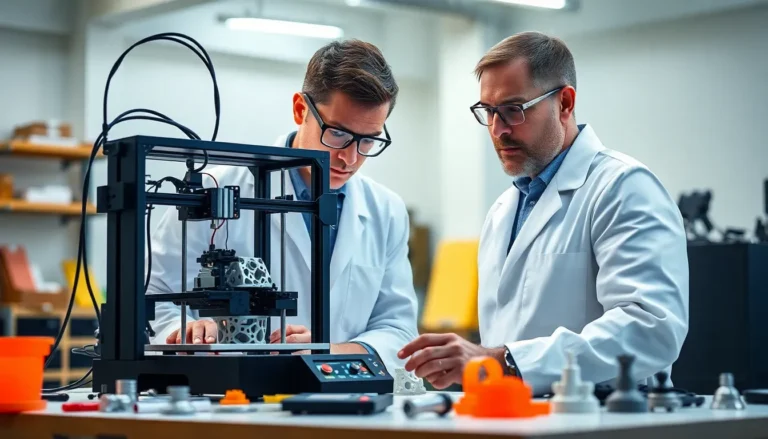In a world where juggling tasks feels like a circus act, personal assistant apps swoop in like superheroes, ready to save the day. Imagine having a trusty sidekick that remembers appointments, manages to-do lists, and even gives reminders to hydrate—because let’s face it, who hasn’t forgotten to drink water while binge-watching their favorite show?
These apps don’t just streamline daily chaos; they add a sprinkle of magic to productivity. With features that can turn even the most disorganized person into a scheduling wizard, personal assistant apps are the ultimate wingmen in the quest for efficiency. Whether it’s planning a dinner party or tackling that never-ending work project, these digital helpers are here to lighten the load and keep life running smoothly. So, why not let technology do the heavy lifting while you focus on the fun stuff?
Table of Contents
ToggleOverview of Personal Assistant Apps
Personal assistant apps serve as vital tools for task management and organization. These applications help users keep track of their schedules and responsibilities effectively. Various features like calendar integration, reminder settings, and to-do lists enhance daily productivity.
Functionality varies across popular options, including virtual assistants such as Siri, Google Assistant, and Alexa. Users can access these platforms on multiple devices, allowing for seamless transitions between smartphones and smart speakers. Task automation plays a significant role in simplifying complex routines.
Customization options empower individuals to tailor the app experience to their preferences. Users can sort tasks by priority, set deadlines, and categorize items based on projects or personal goals. Voice activation streamlines the process, ensuring hands-free operation when multitasking.
Data synchronization enhances efficiency by updating across all connected devices. This feature helps maintain consistency and keeps information readily available. Analytics tools within some apps track progress, providing insights into productivity patterns.
Overall, personal assistant apps transform how individuals manage time and tasks, making them indispensable in today’s fast-paced world. By prioritizing user convenience, these apps simplify everyday challenges.
Key Features of Personal Assistant Apps

Personal assistant apps streamline daily tasks, enhancing user efficiency. These applications come equipped with various features that contribute significantly to productivity.
Voice Recognition
Voice recognition technology simplifies user interaction. Users can issue verbal commands to complete tasks, making hands-free operation more accessible. Accuracy rates for top personal assistant apps exceed 90%, ensuring reliable execution. This feature allows individuals to set reminders, search the web, or control smart home devices without manual input. With natural language processing, voice recognition becomes intuitive, adapting to different accents and speech patterns. Overall, voice recognition transforms the user experience, fostering a seamless digital interaction.
Task Management
Task management capabilities play a crucial role in personal assistant apps. Users can create, edit, and organize to-do lists with ease. Options for setting deadlines support prioritization, allowing focus on essential activities. Notifications and reminders ensure individuals stay on track with their commitments. Collaboration features, such as sharing tasks with others, enhance team productivity. Users can also categorize tasks based on urgency or project, making it simple to visualize progress. Task management functionalities keep users organized and efficient in their daily routines.
Calendar Integration
Calendar integration enhances scheduling efficiency within personal assistant apps. Users can effortlessly sync appointments from various calendars, consolidating all commitments in one location. Notifications remind individuals about upcoming events, ensuring nothing gets overlooked. Users can view schedules through intuitive interfaces, making it easy to prioritize engagements. The ability to create events simply by speaking adds convenience. Integration with multiple calendars helps users manage work-life balance effectively, allowing smoother transitions between professional and personal responsibilities.
Popular Personal Assistant Apps
Personal assistant apps offer diverse features to enhance productivity and streamline daily tasks. Here are some standout options.
Siri
Siri, Apple’s personal assistant, integrates seamlessly with iOS devices. Users can set reminders, send messages, and make calls using voice commands. It excels in understanding context, making conversations flow naturally. Siri also supports a range of third-party applications, enhancing its usefulness. You can easily schedule events or check the weather with simple requests. It boasts significant accuracy and recognizes individual speech patterns, which improves its functionality over time.
Google Assistant
Google Assistant stands out with its powerful search capabilities. It provides users with instant information based on Google’s extensive database. Voice activation allows for hands-free operation, making it an appealing choice for busy individuals. Calendar integration ensures appointments sync across devices, simplifying time management. It can control smart home devices easily, allowing automation of daily routines. Users appreciate its ability to handle complex tasks through natural language conversation.
Amazon Alexa
Amazon Alexa is renowned for its smart home integration. Users can control compatible devices, adjust settings, and check security features effortlessly. Its extensive skills library expands functionality, enabling diverse tasks beyond simple inquiries. Voice commands evoke instant responses, facilitating quick interactions. Alexa can manage to-do lists and reminders effectively, helping users stay organized. With multi-room audio, it also transforms entertainment experiences in homes efficiently.
Benefits of Using Personal Assistant Apps
Personal assistant apps enhance productivity by streamlining daily tasks. Many users find that these apps remember appointments, making schedule management effortless. Task automation reduces the complexity of routines, allowing individuals to focus on important activities.
Calendar integration proves invaluable, as it syncs appointments from multiple sources. Notifications for upcoming events help users stay organized. Users can create events simply through voice commands, which streamlines planning.
Voice recognition technology powers hands-free operation. Accuracy rates exceed 90%, ensuring commands are processed with precision. This feature allows users to set reminders quickly, conduct web searches, and control smart home devices without manual input.
Customization options further empower users by letting them prioritize tasks according to urgency. Some apps enable sorting tasks, which ensures focus remains on critical commitments. Collaborating with others through task management features promotes accountability and teamwork.
Popular options like Siri, Google Assistant, and Amazon Alexa feature unique strengths. Siri integrates seamlessly across Apple devices, understanding context for natural interactions. Google Assistant excels in finding information quickly, making it indispensable for busy individuals. Amazon Alexa stands out with smart home capabilities, allowing users to manage devices and tasks effectively.
Analytics tools included in some apps provide insights into productivity patterns. Tracking progress over time helps identify areas for improvement. Ultimately, personal assistant apps play a crucial role in maximizing efficiency in today’s fast-paced environment.
Challenges and Limitations
Personal assistant apps face several challenges and limitations that impact their overall effectiveness. Users often report issues with voice recognition accuracy, especially in noisy environments. Despite exceeding accuracy rates of 90%, these apps can sometimes misinterpret commands, leading to frustration.
Privacy concerns frequently arise when using these apps. Many users hesitate to share personal information due to worries about data security. Despite encryption measures, breaches can still occur, making users cautious about trusting these digital assistants.
Moreover, dependency on internet connectivity limits functionality. Certain features require a stable internet connection to operate efficiently. Offline capabilities may vary significantly between apps, impacting their usability during travel or in remote areas.
Compatibility issues also present challenges. Users may experience difficulties when integrating personal assistant apps across different operating systems or devices. While most popular options support cross-platform functionality, glitches can impede the seamless transition users expect.
Additionally, the learning curve of personal assistant apps can deter some users. Not all individuals feel comfortable adapting to new technologies, leading to underutilization of available features. Simplified interfaces, along with targeted tutorials, might help bridge this gap.
Lastly, limited contextual understanding can hinder performance. Personal assistant apps may struggle to grasp the nuances of complex tasks. Frequent updates and AI advancements could enhance contextual awareness over time, but current limitations occasionally hinder task completion.
Overall, while personal assistant apps provide numerous benefits, potential users must recognize these challenges. Being aware of their limitations allows for more informed decisions regarding their usage.
Personal assistant apps are transforming how individuals manage their daily lives. By offering features that streamline tasks and enhance productivity, these apps have become essential tools for those seeking efficiency. With options like Siri, Google Assistant, and Alexa, users can enjoy seamless integration across devices and hands-free operation.
While these apps provide significant benefits, it’s important to remain aware of their limitations. Challenges such as voice recognition accuracy and privacy concerns may affect user experience. However, as technology evolves, personal assistant apps are likely to improve, making them even more valuable in today’s fast-paced environment. Embracing these tools can lead to a more organized and productive lifestyle.



